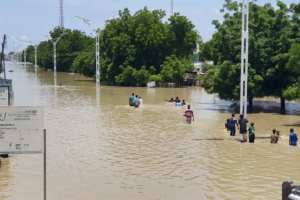NPR’s Steve Inskeep talks to Associated Press reporter Cara Anna about the humanitarian situation in Tigray — the war-torn region of Ethiopia where people are facing famine.
TRANSCRIPT
STEVE INSKEEP, HOST:
The United Nations is warning of famine in the Tigray region of Ethiopia. A mother and a newborn weighing just 1.7 pounds died from hunger at a health center last week. The government is accused of refusing to allow food and medical supplies and fuel from getting into this region, all of which is happening in a place that’s in a civil war with the central government. The AP’s East Africa reporter Cara Anna is in Nairobi and covering this story. Welcome.
CARA ANNA: Hi. Thank you for speaking with me.
INSKEEP: As best you can determine, why is sufficient food not reaching that region?
ANNA: This war has gone on for almost a year, but there was a significant reversal in June when the Tigray fighters retook most of the region. At that point, Ethiopia sort of withdrew their soldiers and declared what they called a humanitarian cease-fire. However, what we found is that it’s far from the case. Actually, the region is now cut off more than ever from the world, and that includes – and this worries humanitarian workers and others – very, very little – almost no humanitarian aid is now getting in – no medical supplies at least for the past month, no fuel for the past month, and then food warehouses are going empty. And this is because, you know, people say Ethiopia’s government is just scared that this aid – instead of going to civilians, it’ll go to the Tigray fighters. And people are now dying because of it.
INSKEEP: Is there evidence that the Ethiopian military is effectively trying to starve the rebels out, then?
ANNA: That’s – actually, what people are saying is this is less a military decision, but a decision by Ethiopia’s government, its senior leadership. Just the concerns that they – you know, they just don’t want anything, to the extent that even humanitarian workers who are boarding these rare flights to the region, they’re giving this – they are given this list of things that they are not allowed to bring, including personal medication, multivitamins, things like nail clippers. And that sort of – to us, we included that in the story because that really demonstrated the level – you know, just the concern that – of getting anything to these fighters. However, you have millions of civilians who are now being affected. They are going hungry.
INSKEEP: When those aid workers come back out, what kinds of stories do they tell?
ANNA: We have spoken to people who are describing just – the effects of this include such things as – you know, latrines in crowded displacement camps are overflowing because cash is gone. You know, banking services are cut off. People can’t bring much cash to the region, so they can’t pay people to just simply clean toilets. And, of course, that, you know, can greatly, you know, increase the – people could be getting sick in these camps because of that. Sanitation is going down. Because food is running out, people are having to rely increasingly on local communities who can barely afford to feed themselves at this point. These are just some of the things that we’re starting to hear.
INSKEEP: I’m glad that you mentioned displacement camps. There are plenty of people who have been displaced by this year of fighting. Are people, at this point, able to flee the region entirely?
ANNA: I would say that’s increasingly difficult. You saw people early in the war – thousands – about 60,000 – go into neighboring Sudan. But now that way is essentially blocked off by – you know, by fighters of various kinds. So it’s increasingly difficult just to leave. And so what you have is – you have this large diaspora around the world, especially in the United States, who are saying that for weeks and even months, they have no idea what’s happened to their families. They don’t know if they are alive or dead. And in some cases, you know, this weight and this worry has gone on for nearly a year.
INSKEEP: You know, a lot of times in conflict zones anymore, we get lots of information from people’s phones. People will send out videos. People will call out. Is that not happening as much here?
ANNA: Well, telecommunications are cut off, and there’s a – very, very little internet access. So at the moment, the Tigray region is sort of just this black hole more than ever.
INSKEEP: Cara Anna of The Associated Press. Thanks for your reporting. Really appreciate it.
ANNA: Thank you.




